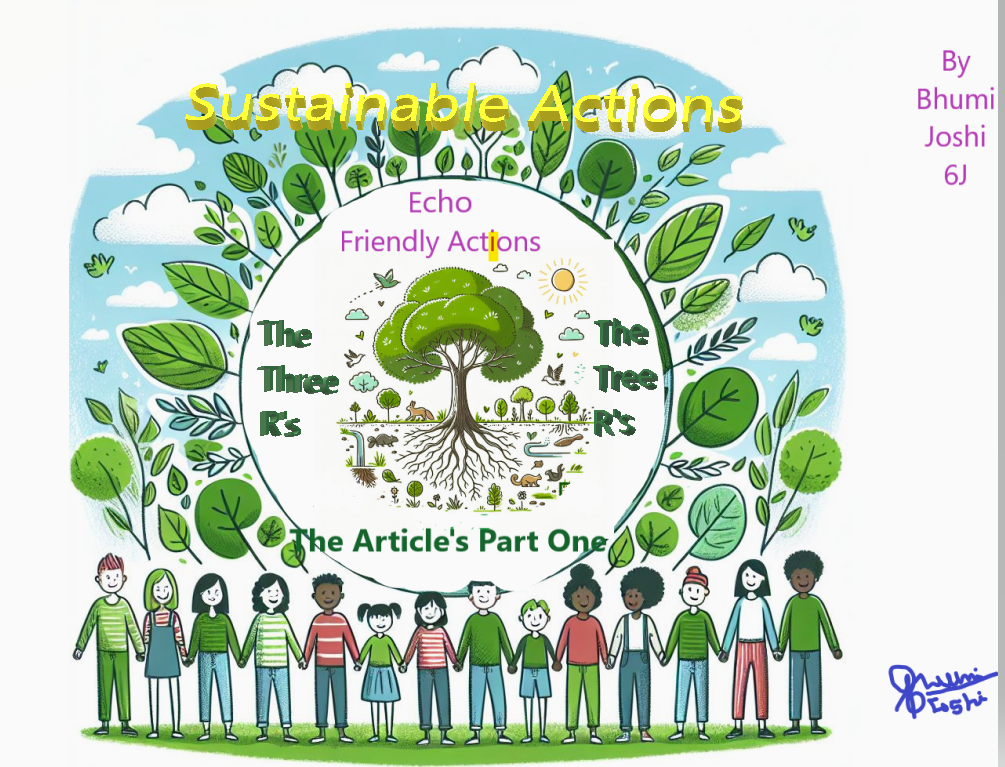This is the part one of the article which discusses about the three R's. The second and last part will be discussing about people's achievements of the three R's in real life.
Hello dear sustainable worker! This article states on the importance of the echo friendly R's. You might know about the three R's- Reduce, Reuse and Recycle. There are two other R's as well. They are Repurpose and Refuse. In today’s world, where environmental concerns are at the forefront of global discussions, adopting eco-friendly actions has become more crucial than ever. One effective approach to sustainability is embracing the concept of the “Five R’s” (Refuse, Reduce, Reuse, Repurpose, and Recycle). These principles guide us in making conscious choices that minimize waste and promote a healthier planet. In this series, “Eco-Friendly Actions: The R’s,” we will delve into each of these principles, exploring practical ways to incorporate them into our daily lives.
Refuse
Refusing is about making conscious decisions to avoid products that are harmful to the environment. This can include:
- Saying no to single-use plastics: Items like plastic straws, cutlery, and bags are often used once and then discarded, contributing to pollution. Opt for reusable alternatives instead.
- Avoiding products with excessive packaging: Choose items that come with minimal or eco-friendly packaging. This reduces the amount of waste that ends up in landfills.
- Rejecting fast fashion: The fashion industry is a major polluter. By refusing to buy from brands that prioritize fast fashion, you can support more sustainable practices.
Reduce
Reducing involves cutting down on the amount of resources we consume. Here are some ways to reduce:
- Energy consumption: Turn off lights and appliances when not in use, and consider using energy-efficient bulbs and devices.
- Water usage: Fix leaks, take shorter showers, and use water-saving fixtures to conserve water.
- Food waste: Plan meals, store food properly, and compost organic waste to reduce the amount of food that gets thrown away.
Reuse
Reusing items helps extend their lifespan and reduces the need for new products. Consider these tips:
- Reusable containers: Use glass or stainless steel containers for food storage instead of disposable plastic ones.
- Second-hand shopping: Buy clothes, furniture, and other items from thrift stores or online marketplaces. This not only saves money but also reduces demand for new products.
- Repairing items: Instead of discarding broken items, try to repair them. Many communities offer repair cafes where you can get help fixing things.
Repurpose
Repurposing involves finding new uses for old items. Here are some creative ideas:
- DIY projects: Turn old t-shirts into tote bags, use wine corks to make coasters, or transform pallets into garden furniture.
- Upcycling: Give new life to items by upcycling them. For example, you can paint and decorate old jars to use as vases or storage containers.
- Crafting: Use materials like cardboard, fabric scraps, and bottle caps for arts and crafts projects.
Recycle
Recycling is crucial for managing waste and conserving resources. To recycle effectively:
- Know your local recycling rules: Different areas have different guidelines for what can be recycled. Make sure you understand what can and cannot be recycled in your community.
- Clean and sort recyclables: Rinse out containers and sort them according to your local recycling program’s requirements.
- Support recycled products: Purchase items made from recycled materials to close the loop and support the recycling industry.
By embracing the Five R’s, we can all play a part in creating a more sustainable future. Each small action contributes to a larger impact, helping to preserve our planet for future generations. Let’s commit to making eco-friendly choices and inspire others to do the same.
{Key for Highlighters-
light yellow: Introduction and Conclusion
red: Heading
green: Content
I hope you liked my article's part one dear sustainable worker!

